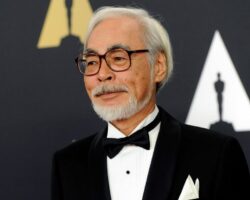Japan Celebrates After Miyazaki Wins a Second Oscar, Marking a First for Asian Talent


Japan’s film industry has had a night of worldwide success, as fans and artists celebrate the historic second Oscar win for anime mastermind Hayao Miyazaki and the first Oscar win for the renowned Godzilla franchise.
In recent years, Asian films or nominations with a largely Asian cast have been more popular at the Academy Awards. In 2020, the South Korean thriller “Parasite” won three further awards, including best picture, making history as the first non-English film to do so.
Then came “Everything Everywhere All at Once,” which dominated last year and is an absurdist action comedy centred around the cultural disparities a Chinese immigrant family faces in America. It won seven, including best supporting part for Ke Huy Quan, a Vietnamese native, and best actress for Michelle Yeoh, a Malaysian, who both gave out prizes on Sunday.
This year, Japan’s skill was very much in the spotlight.
“The Boy and Heron,” the most recent anime masterpiece by Miyazaki, defeated well-liked competitors including Disney’s “Elemental” and Sony Pictures’ “Spider-Man: Across the Spider-Verse” to win best animated feature film on Sunday.
The 83-year-old won his second Oscar with the renowned Studio Ghibli, following “Spirited Away,” which in 2002 became the first non-English animated film to win the same category.
“Ghibli’s reputation has grown dramatically over the past 20 years and it’s a credit to the quality of its output over nearly four decades,” Tokyo-centered CNN was informed by Roland Kelts, the author of “Japanamerica: How Japanese Pop Culture Invaded the US.”
“It may be also more significant for the Oscar Academy in showing that they recognize the artistic genius of Miyazaki and that they can parse the difference between animation as pure entertainment (which characterizes most American animation) and animation from Japan,”the man stated.
Since establishing Studio Ghibli in 1985, Miyazaki has grown to become one of the most significant cultural figures in the nation.
His otherworldly creations, which are created by painstakingly hand-drawing each frame by hand, have come to be associated with Japanese animation.
Many of his beloved films, such “My Neighbor Totoro and “My Neighbour Totoro,” tackle difficult and profound subjects like puberty, violence, and death while fusing magical and spiritual themes with folklore.
After the prize ceremony, Toshio Suzuki, the producer of “The Boy and Heron,” said he called Miyazaki. The low-key animator, who is renowned for his Zen-like manner and overall dislike of the spotlight, gave him a somewhat typical response, according to Japan’s national broadcaster NHK.
“I said to him, ‘Congratulations!’ Suzuki said. “And he said to me, ‘The same word goes to you!’ And he laughed.”
After seven years of production, Suzuki released a statement in which he described the movie as “truly difficult to bring to completion.”
“Both Hayao Miyazaki and I have aged a considerable amount. I am grateful to receive such an honor at my age,” Suzuki said.
naugural film in the 70-year-old monster franchise, marking another significant milestone for Japan on Sunday.
Since the 1954 release of the first Godzilla film in Japan, the franchise has influenced numerous generations of filmmakers and fans.
Since then, scores other Godzilla adventures have been published, many of which have dealt with environmental disasters and Japan’s unique position as the only country to have nuclear weapons against it.
The cast and crew of the most recent Godzilla film were ecstatic with their victory. On social media platform X, special effects artist Tatsuji Nojima shared a picture of a Godzilla figure next to an Oscar statue.
“Oscar, get! Wow,” he said in a post that included numerous exclamation points.
The filmmaker of “Godzilla Minus One,” Takashi Yamazaki, stated that his adventure started forty years ago when his young imagination was blown away by the sci-fi films “Star Wars” and “Close Encounters of the Third Kind.”
“I was somehow so far from Hollywood, and even the possibility of standing on this stage seemed out of reach,” he said. “This award is proof that everyone has a chance.”
Beyond mere accolades
Social media was flooded with congratulations following Sunday’s victory, from both the public and lawmakers.
Miyazaki’s “unrestrained imagination and keen insight”and Yamazaki’s “outstanding technical skills and expressive ability” were both commended by Japanese Prime Minister Fumio Kishida.
According to a statement released by Kishida’s office, their work struck a chord “with many people beyond borders and languages, surprising and moving them,”
Aichi prefecture’s governor, Hideaki Omura, announced that the Ghibli Park, which is based on worlds made by Miyazaki, will debut new exhibits from “The Boy and Heron” on April 16 (NHK).
Twitter users in Japan were ecstatic at Godzilla’s Hollywood victory.
One user commented on X, saying, “I felt that this was the moment when Godzilla was finally recognized not only in Japan but also in the world,”
For others, Japan received a boost from the prize following a difficult start to the year.
A 7.5-magnitude earthquake that struck Ishikawa prefecture on January 1 resulted in over 200 fatalities and thousands of homeless people. Five relief workers perished in an aircraft crash the following day while travelling to the scene of the tragedy.
A user on X recounted how Japan’s women’s football team became the first Asian team to win the World Cup in 2011, months after a devastating earthquake and tsunami shook the country’s northeast coast.
The X user went on to say that this Oscar victory is “something that shows a glimmer of hope in the midst of despair,” “This is what we need now.”
Honouring Miyazaki’s creative brilliance
The fact that critics believe this might be the octogenarian animator’s last film means the prize will undoubtedly be significant for both Miyazaki and his followers.
In order to create the movie, which centres on a little child who moves to the country after losing his mother in a hospital fire and meets a mystical grey heron, Miyazaki stepped out of retirement.
According to reports, Miyazaki drew a lot of inspiration for the story, which tackles themes like optimism and grief in a world full of strife and tragedy.
The film, which deftly avoided a publicity campaign, earned just under $13 million in its debut weekend after making its world premiere in Japan in June. It also topped the North American box office.
The second Oscar victory, according to author Kelts, who is based in Japan, demonstrated that the Academy had acknowledged Miyazaki’s creative brilliance and that Japanese animation is considerably more than just for amusement.
As to Kelts, it “touches upon the sublime and is often freer.” Kelts is also a visiting lecturer at Waseda University in Tokyo.
That an artist in his 80s could create gigantic and unrelentingly energetic work is encouraging, he added. “Absolutely worth it and well-deserved.”

